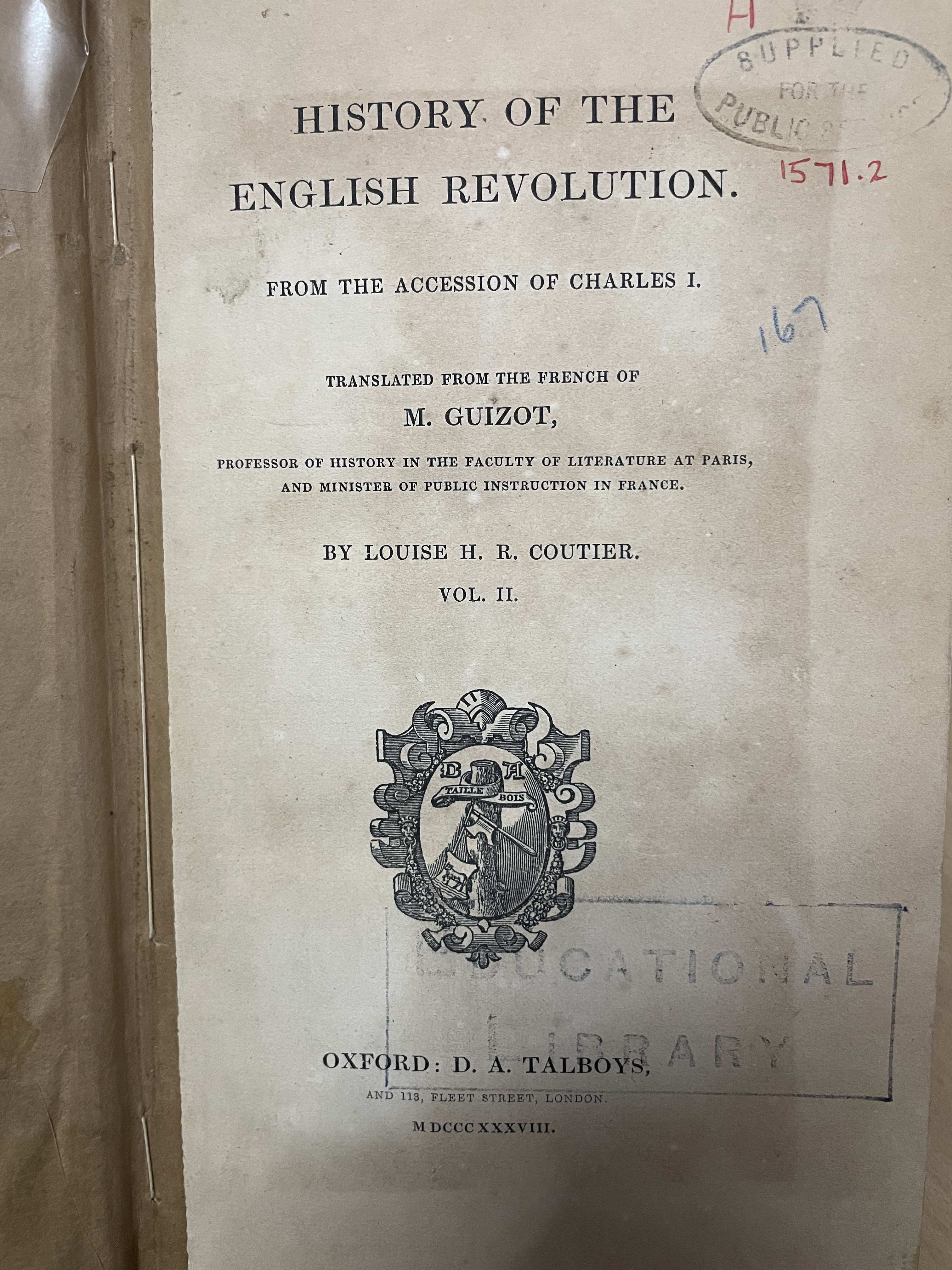History of the English Revolution

About
Summary
Exquisite
TOC
Details
Related
URL
Images
Overview
History of the English Revolution of 1640 by François Guizot, translated by Louise H.R. Coutier, provides a detailed account of the English Revolution, also known as the Great Rebellion, from the accession of Charles I to his death. Guizot, a French historian and statesman, offers insights into the political, religious, and social factors that led to the revolution, as well as its key events and figures.Guizot's History of the English Revolution of 1640 examines the causes, events, and consequences of the English Revolution. The book covers the period from the beginning of Charles I's reign in 1625 to the aftermath of his execution. It delves into the conflicts between the monarchy and Parliament, the rise of Puritanism, the English Civil War, and the establishment of the Commonwealth. Guizot analyzes the key figures of the revolution, such as Charles I, Oliver Cromwell, and John Pym, and explores the social and intellectual currents that shaped the era.
Importance of Book
Detailed Historical Account: The book provides a comprehensive and detailed account of the English Revolution, covering its political, religious, and social dimensions.
Analytical Perspective: Guizot offers an analytical perspective on the causes and consequences of the revolution, exploring the underlying forces that shaped its course.
Influence on Historical Thought: The book has influenced subsequent historical scholarship on the English Revolution, shaping interpretations of its significance and legacy.
Understanding Political Development: It contributes to understanding the development of political ideologies and institutions in England and beyond.
Key Themes
Conflict Between Monarchy and Parliament: The book explores the growing tensions between Charles I and Parliament over issues of taxation, religion, and royal authority.
Rise of Puritanism: Guizot examines the role of Puritanism in fueling the revolution, as Puritan religious beliefs clashed with the policies of the Anglican Church and the Crown.
English Civil War: The book provides a detailed account of the military and political events of the English Civil War, including key battles, such as the Battle of Edgehill, and the emergence of Oliver Cromwell as a military leader.
Social and Intellectual Change: Guizot analyzes the social and intellectual transformations that occurred during the revolution, including the rise of new ideas about liberty, equality, and religious toleration.
The Role of Key Figures: Examination of influential leaders like Charles I, Cromwell, and Pym, assessing their impact on the revolution's trajectory.
Cultural Significance
Historical Interpretation: The book offers a valuable interpretation of the English Revolution from a 19th-century French perspective, highlighting the revolution's significance in the broader context of European history.
Influence on Historical Thought: Guizot's work has influenced subsequent historical scholarship on the English Revolution, shaping interpretations of its causes and consequences.
Comparative Analysis: By comparing the English Revolution to the French Revolution, Guizot provides insights into the common themes and divergent paths of these two major historical events.
Understanding Political Ideologies: The book helps understand the development of political ideologies such as liberalism and constitutionalism in the context of the English Revolution.
Effects on Society
Shaping Political Thought: The English Revolution had a profound impact on the development of political thought in England and beyond, inspiring ideas about limited government, individual rights, and the rule of law.
Religious Toleration: The revolution led to greater religious toleration in England, as Puritan and other nonconformist groups gained greater freedom to practice their faith.
Parliamentary Sovereignty: The revolution established the principle of parliamentary sovereignty, limiting the power of the monarchy and strengthening the role of Parliament in English government.
Social Change: The revolution brought about significant social changes, including the decline of feudalism and the rise of a more individualistic and mobile society.
Influence on Later Revolutions: The English Revolution served as a model and inspiration for later revolutions around the world, including the American and French Revolutions.
Conclusion
History of the English Revolution of 1640 by François Guizot, translated by Louise H.R. Coutier, provides a detailed and insightful account of the English Revolution, exploring its causes, events, and consequences. The book's cultural significance lies in its historical interpretation, its influence on historical thought, and its contribution to understanding the development of political ideologies. The English Revolution's impact on country and society was profound, shaping political thought, promoting religious toleration, and establishing the principle of parliamentary sovereignty.
Table of Content
Louise H. R. Coutier\'s History of the English Revolution (1837) is a historical text that would have aimed to cover the major events and figures of the English Revolution, also known as the English Civil War. Here is a reconstructed table of contents based on typical structures for such works from that period:IntroductionOverview of the Revolution\'s significance
Historical context and scope of the work
The Prelude to RevolutionPolitical and Religious Landscape
Social and Economic Conditions
Early Conflicts and Grievances
The Reign of James IPolitical Issues and Parliament Relations
Religious Tensions
The Reign of Charles IConflict with Parliament
Key Issues Leading to War
Major Political and Religious Disputes
The Outbreak of the Civil WarThe Escalation of Conflict
Major Battles and Strategic Developments
The Course of the Civil WarSignificant Battles and Campaigns
The Role of Major Figures (e.g., Oliver Cromwell, King Charles I)
Key Military and Political Strategies
The Trial and Execution of Charles IThe Proceedings of the Trial
The Political and Social Repercussions
The Commonwealth PeriodThe Government under Oliver Cromwell
Political and Social Reforms
Challenges and Controversies
The Restoration of the MonarchyCharles II and the Return to Monarchical Rule
Changes in Governance and Society
The Aftermath of the Revolution
ConclusionThe Legacy of the English Revolution
Reflections on its Impact on British History
AppendicesImportant Documents and Speeches
Biographical Notes on Key Figures
Title
History of the English Revolution
Author
Louise H R Coutier
Name of Publisher
Talboys Oxford
Publish Date
1837
Subject
historical account of the English Revolution.
Vintage
1801-1900
Number of Pages
413
Category
History
Sub Category
Literary
Rarity
RARE
